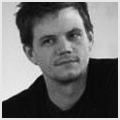| |
| |

|
|
KAREN BECKMAN (PENN)
Karen Beckman is a Professor of Cinema and Modern Media in the department of the History of Art at the University of Pennsylvania. She is currently working on a short book entitled Animation and the Contemporary Art of War, as well as an edited volume entitled Animating Film Theory, which will explore the challenges animation poses for the discourse of film theory. She is a senior editor of the MIT journal Grey Room, the author of Vanishing Women: Magic, Film and Feminism and Crash: Cinema and the Politics of Speed and Stasis; and the co-editor of Still Moving: Between Cinema and Photography, with Jean Ma, and On Writing With Photography, with Liliane Weissberg (forthcoming). |
 |

|
|
ERNA FIORENTINI (Humboldt)
"Introductory Remarks about Enchanted Drawing, Part I"
Erna Fiorentini teaches Art History at the Kunsthistorisches Institut of Freie Universität Berlin and the Institut für Kunst- und Bildgeschichte of Humboldt Universität zu Berlin. She is currently a visiting Fellow in the History of Art Department of the University of Oxford.
Trained as a scientist as well as a historian of art, she has focused her research interests on the history and theory of vision as a fundament of imaging processes and on the theory and history of the relationship of aesthetics and knowledge in processes of image production. With her current book project, Induction of Visibility: An Attempt at the Notion of Aesthetic-epistemic Action, she intends to disturb and specify the concept of visualisation, that is mostly used for visual processes and products likewise, with a notion of "Visibility induction" that more specifically refers to the aesthetic and epistemology of image production processes. |
|
 |

|
|
OLIVER GAYCKEN (Maryland)
"With Particle Swarms and Bad Hair: Animating Material Digitally"
Oliver Gaycken received his BA in English from Princeton University and his Ph.D. from the University of Chicago. His teaching interests include silent-era cinema history, the history of popular science, and the links between scientific and experimental cinema. He has published on the discovery of the ophthalmoscope, the flourishing of the popular science film in France at the turn of the 1910s, the figure of the supercriminal in Louis Feuillade's serial films, and the surrealist fascination with popular scientific images. He is currently writing about the figure of the detective/scientist in the films of Billy Wilder and conducting research into the American popular science film before 1920. His book project is entitled Devices of Curiosity: Cinema and the Scientific Vernacular.
|
|
 |

|
|
VIVIAN SOBCHACK (UCLA)
"Stop + Motion: On Animation, Inertia, and Innervation"
Vivian Sobchack was the first woman elected President of the Society for Cinema and Media Studies, and is on the Board of Directors of the American Film Institute. Her essays have appeared in journals such as "Quarterly Review of Film and Video," "Film Comment," "camera obscura," "Film Quarterly" and "Representations." Her books include Screening Space: The American Science Fiction Film; The Address of the Eye: A Phenomenology of Film Experience; and Carnal Thoughts: Embodiment and Moving Image Culture, and she has edited two anthologies: Meta-Morphing: Visual Transformation and the Culture of Quick-Change; and The Persistence of History: Cinema, Television, and the Modern Event. Her research interests are eclectic: American film genres, philosophy and film theory, history and phenomenology of perception, historiography and cultural studies. |
|
 |

|
|
SCOTT CURTIS (Northwestern)
"Rough and Smooth: Toward a Rhetoric of Animated Scientific Images"
Scott Curtis studies the history of film, especially early and silent-era cinema. He is particularly interested in
the institutional appropriation of motion pictures, such as educational filmmaking or the use of moving image
technology as a scientific research tool or diagnostic instrument. He has published on a wide variety of topics,
including early film theory; film sound; animation; Alfred Hitchcock; Douglas Fairbanks; the Motion Picture
Patents Company; industrial film; and the scientific use of motion pictures, such as medical cinematography
and microcinematography. He has held posts as the medical photographer for Sacred Heart Medical Center
in Eugene, the research archivist for the Special Collections Department of the Academy of Motion Picture
Arts & Sciences' Margaret Herrick Library, and a lecturer for the Critical Studies Department of the University
of Southern California. He is also the founder of and faculty advisor for Block Cinema, a co-chair of Chicago
Film Seminar, and the President of Domitor, an international association dedicated to the study of early
cinema.
He is currently stationed at Northwestern University's branch campus in Doha, Qatar. |
|
 |

|
|
MELISSA RAGONA (Carnegie Melon)
"Algorithmic Aesthetics vs. Punk De'collage: From Animation to Live Performance"
Melissa Ragona teaches a range of courses including MFA Academic Seminar, sophomore required surveys in both Modern and Contemporary Visual Culture, as well as various intermediate and upper level seminars in art history, film, sound, aesthetics, and critical theory. Ragona's critical and creative work focuses on sound design, film theory and new media practice and reception. By forging approaches from the disciplines of film studies, art history, and new media technologies, her work has sought to present a more complex aesthetic, theoretical, and historical foundation for the analysis of contemporary time-based arts. Her current book project, Readymade Sound: Andy Warhol's Recording Aesthetics examines Warhol's tape recording projects from the mid-sixties until the late 70s in light of audio experiments in modern art as well as contemporary practices of pattern matching and information visualization. Her essays that explore the nexus between sound and image in the films of Hollis Frampton and Paul Sharits have been published, respectively, in the MIT Press Journal, October and a forthcoming anthology, Lowering the Boom: New Essays on the Theory and History of Film Sound (Illinois University Press, 2008). In "Swing and Sway: Marie Menken's Cinematic Events," Women Experimental Filmmakers, ed. Robin Blaetz, Duke University Press (2007), she examines how Warhol Superstar and artist, Marie Menken used film as a way to rethink the transition from abstract expressionism to Pop Art in the 1950s and 1960s. She has also published in monographs on the work of artists, Heike Mutter and Ulrich Genth (Kerber Christof Publishers, 2006) and Christian Jankowski (JRP Ringier, 2007). Also, her book, Readymade Sound: Andy Warhol's Recording Aesthetic, is forthcoming from the University of California Press. |
|
 |

|
|
DONALD CRAFTON (Notre Dame)
"Inside and Outside the Toon Body: Challenging Somatic Integrity through Animation History"
Donald Crafton is a specialist in film history and visual culture, earned his bachelor's degree from the University of Michigan, his master's degree from the University of Iowa, and a master's and doctorate from Yale University. He was the founding director of the Yale Film Study Center, and served as director of the Wisconsin Center for Film and Theater Research. Crafton chaired the Department of Film, Television, and Theatre at Notre Dame from 1997 to 2002 and 2008-2010, and the Department of Music from 2004-2007.
Crafton's research interests are in film history and visual culture. His most recent publication is The Talkies: American Cinema's Transition to Sound, 1926-1931 (California, 1999). He was named Academy Film Scholar by the Academy of Motion Picture Arts and Sciences in 2000 and was the recipient of an NEH Fellowship for 2003-04. The World Festival of Animation presented him in 2004 with an award for his contributions to animation theory. He received the University of Notre Dame's Presidential Award in 2007. |
|
 |

|
|
JIMENA CANALES (Harvard)
"Animating Einstein: 'The final days of my Zurich stay resemble a runaway motion picture projector'"
Jimena Caneles works on Experimental History of Science (EHS) in which the historical development of science is not judged according to contemporary standards. Her book, Tenth of a Second, argues that:
"Scientists observe, develop theory and experiment, but first they redraw metaphysical boundaries, redefining the very meaning of what is considered to be human, nonhuman, and beast. They shape the contours and alter hierarchies between the social, the political, the historical and the natural. It is more urgent to work on how these divisions arise and to understand their repercussions than it is to study derivative scientific controversies and results."
Canales sees the relation between science and history as the central intellectual problem of modern times starting at around 1850. This problem haunts the physical sciences (particularly thermodynamics), the life sciences (microbiology), theories of evolution, and history as a discipline. EHS focuses on the relation between science, technology and history as the central intellectual problem of modern times. |
|
 |

|
|
HANNA ROSE SHELL (MIT)
"Disruptive Pattern Material"
Hanna Rose Shell is a historian of science and media, and a filmmaker.She received a Ph.D. in the History of Science from Harvard in 2007 and an M.A. in American Studies from Yale University in 2002. She completed her A.B. at Harvard College (History and Science). She was elected as a Junior Fellow at the Harvard Society of Fellows in 2007, where she was in residence in 2008-2009. Shell's book based on her doctoral work Hide and Seek: Camouflage and the Media of Reconnaissance, will appear from Zone Books. Shell edited a reprint of W.T. Hornaday's Extermination of the American Bison (Smithsonian Press, 2002 [1889]), and has published widely on natural history preservation and display practices, the history of ecology, experimental film history, and renaissance history of geology and art.
Her recent films include Locomotion in Water (2005), about the history of chronophotographic practice in science, and and Secondhand (Pepe): Lives and Afterlives of the Social Fabric (2007), an exploration of textile recycling, diaspora cultures and cross-cultural history.
Shell is affiliated with the Comparative Media Studies (CMS) program at MIT. |
|
 |

|
|
KIRSTEN OSTHERR (Rice)
"From Health Films to Healthy Games: Interventionist Animation"
Kirsten Ostherr teaches film and media studies, focusing on ephemeral film and historical and contemporary visualizations of health and disease in photography, film, television, animation, advertising, and medical imaging. In Fall 2011 she was a Visiting Scholar at the Institute for Medical Humanities, at the University of Texas Medical Branch, Galveston, TX. With the support of an Andrew W. Mellon Foundation New Directions Fellowship, she is currently pursuing a Master of Public Health degree at UT-Houston, and is also a Fellow in The John P. McGovern, M.D. Center for Humanities and Ethics, at the University of Texas Health Science Center, Houston, TX. She is author of Cinematic Prophylaxis: Globalization and Contagion in the Discourse of World Health (Duke, 2005), and Medical Visions: Producing the Patient through Film, Television and Imaging Technologies (Oxford, forthcoming in 2012). Dr. Ostherr has recently published articles on medical animation in the 1920s, health education films of the postwar period, narrative medicine and biocultures, ethical issues in the film Philadelphia, and corporate publicity films. She has also published on art film, documentary, and science fiction film. Dr. Ostherr lectures widely and has recently given invited talks in Geneva, Chicago, San Diego, Galveston, Houston, Philadelphia, and New York. Her work has been supported by a variety of grants and fellowships. Dr. Ostherr's current work focuses on networked patients and hospitals, social media and health movements, and the age of bioinformatics. She is PI on the Medical Futures Initiative, a collaborative institute for training the medical media innovators of the future through creative, hands-on critical thinking and design. A cornerstone of Medical Futures is "Project TMC," a pilot program that joins Rice undergraduates with Texas Medical Center physician-researchers to develop videos and other communications media that translate their work for patients and the wider health community.
|
|
 |

|
|
PEGGY WEIL (USC–School of Cinematic Arts)
"Immersive Journalism / Immersive Data"
Peggy Weill is a digital media designer and artist focused on interactive media and immersive design. A graduate of Harvard University, she received her Masters Degree at M.I.T. As an original member of the Architecture Machine Group (now the M.I.T. Media Lab) from 1980-1982, she worked on pioneering interactive projects in design and telepresence, going on to create titles for The Voyager Company, Broderbund, Electronic Arts, Von Holtzbrinck and Ravensberger Interactive. The award-winning Voyager title, A Silly Noisy House, published in 1991, was one of the first interactive titles for children. She designed the original Roden Crater website in 1996 for Skystone and James Turrell. Weil was awarded the MILIA D'OR in Cannes in 1998 for the CD-ROM series Moving Puzzle. She is the mind behind MrMind, a computer program who challenges us to convince him that we are human.
Weil has several titles in the Serious Games space: she was Creative Producer and Designer for USC's Institute for Creative Technology E.L.E.C.T. project, a role-playing game to increase cultural awareness in Army Officers and The Redistricting Game, a USC Annenberg Center sponsored project to increase voter awareness about redistricting. Other projects include Gone Gitmo, a virtual installation of Guantánamo Prison (recently acquired by EDGE Lab at Ryerson University in Toronto and documented in the LABoral Exhibition Catalogue and Wall Jumpers, a global visualization of political separation barriers and The IPSRESS Project, a collaboration with The EVENT LAB in Barcelona.
Her work is has been exhibited internatinally at FeedForward, The Angel of Historyat LABoral in Gijon, Spain and presented at Games for Change in NYC, The Center for Human Rights at UC Berkeley, MIPDOC and MIPTV in Cannes, Arte e Ciencia in Benasque, Spain, RAVE (Real Actions Virtual Environments) in Barcelona, Simposio Feedforward in LABoral, Gijon, ARGFest (Alternative Reality Game Festival), and PICNIC Amsterdam. Weil has taught graduate level courses as Visiting Assistant Professor at USC-SCA Interactive Media Division and Adjunct Professor at the Design School at California College of the Arts CCA in San Francisco. She is currently Adjunct Professor at USC School of Cinematic Arts in both Graduate Production and Interactive Media Divisions. |
|
 |

|
|
NORMAN I. BADLER (PENN)
"Digital Animation from a Technical Perspective"
Norman I. Badler is a Professor of Computer and Information Science at the University of Pennsylvania and has been on that faculty since 1974. Active in computer graphics since 1968 with more than 200 technical papers, his research interests include embodied agent animation and simulation, human-computer interfaces, crowd modeling and control, and computational connections between language and action. Badler received the BA degree in Creative Studies Mathematics from the University of California at Santa Barbara in 1970, the MSc in Mathematics in 1971, and the Ph.D. in Computer Science in 1975, both from the University of Toronto. He was the Cecilia Fitler Moore Department Chair of Computer and Information Science from 1990-94. He directs the SIG Center for Computer Graphics and the Center for Human Modeling and Simulation at Penn. Among the Center's achievements are the human modeling software system Jack that was the basis for a spin-off company in 1996; the software is now marketed by Siemens. He is the Director of the BSE in Digital Media Design undergraduate program and the Faculty Executive Director of the Masters in Computer Graphics and Game Technology program at Penn. During 2001-2005 he was also the Associate Dean of the School of Engineering and Applied Science. |
|

|

|
|
ALEXANDER R. GALLOWAY (NYU)
"Polygraphic Photography and the Origins of 3D Animation"
Alexander R. Galloway is a writer and computer programer working on issues in philosophy, technology, and theories of mediation. He is a founding member of the software collective RSG and creator of the Carnivore and Kriegspiel projects. Currently associate professor of Media, Culture, and Communication at New York University, he is author or co-author of three books on media and cultural theory, Protocol: How Control Exists After Decentralization (MIT, 2004), Gaming: Essays on Algorithmic Culture (Minnesota, 2006), The Exploit: A Theory of Networks written with Eugene Thacker (Minnesota, 2007). In 2010 he co-translated (with Jason E. Smith) Introduction to Civil War by the French group Tiqqun (Semiotext[e]). Recently, the Public School New York published French Theory Today: An Introduction to Possible Futures, a set of five pamphlets documenting Galloway's seminar conducted there in the fall of 2010.
Galloway has given over a hundred lectures both across the U.S. and in ten countries around the world. His writings have been translated into German, French, Italian, Spanish, Portuguese, Swedish, and Polish. He is recipient of a number of grants and awards including a Creative Capital grant (2006) and a Golden Nica in the 2002 Prix Ars Electronica (Linz, Austria). The New York Times has described his practice as "conceptually sharp, visually compelling and completely attuned to the political moment."
Galloway is currently working on two research projects. The first is an archeology of computational media focusing on the nineteenth and twentieth centuries. The second is a new book on the aesthetics and politics of information technology. In his future work he intends to focus more closely on French philosophy and the continental tradition.
|
|
 |

|
|
BOB REHAK (Swarthmore)
"Graphic Engines: Videogame Animation as Transmedia Bridge"
Bob Rehak received his M.A. in Communication Studies at the University of North Carolina (2000) and his Ph.D. in the Department of Communication and Culture at Indiana University (2006). He has published essays in the journals Film Criticism and Information, Communication and Society as well as in the edited collections The Video Game Theory Reader (Routledge), Videogame/Player/Text (Manchester), and The Cybercultures Reader (Routledge). His recent publications include essays in Cinema Journal, the Screen Decades series (Rutgers), and an Oxford Bibliographies Online entry on CGI. He serves on the editorial boards of Animation: An Interdisciplinary Journal, Transformative Works and Cultures, and the Journal of Fandom Studies. He is completing a book-length study of special effects and the evolution of fantastic-media franchises, and preparing a followup project on materializations of fantasy media. |
|
| |
 |
| |
|
|
|
|

